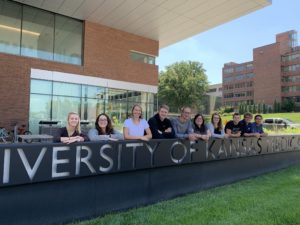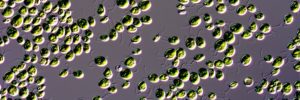Dr. Prachee Avasthi is Bringing Together the Next Generation of Leaders
Dr. Prachee Avasthi is currently an Associate Professor of Anatomy and Cell Biology at University of Kansas Medical Center and will be moving her lab to the Geisel School of Medicine at Dartmouth this August. You can follow her on Twitter @PracheeAC or visit her lab’s site at http://www.avasthilab.org.

When Dr. Prachee Avasthi arrived at University of Kansas Medical Center to start her lab, she felt surprisingly isolated. Her colleagues were fantastic, and the environment nourishing and energetic, but for the first time in her career, she had no fellow cohort or program members with which to compare notes. She, like many other new PIs, had been selected to become a faculty member particularly because her research was unique and would add a new facet to the department, and her brand new lab was not yet up to speed on the science. So when she closed her office door and sat down, she realized that she was alone.
New faculty at institutions across the U.S. often share this feeling. Universities usually have resources to connect junior faculty with more seasoned faculty, so they can grab lunch once a month, or have someone to email if a question pops up. However, as Dr. Avasthi realized, “When you start a lab, you don’t have one question or ten questions – you have a million mundane questions. There’s no mentorship program that can keep up!” Furthermore, new PIs face questions and decisions specific to current times that older faculty might not be able to advise on.
To combat this isolation and bring together others at different universities, Dr. Avasthi created New PI Slack, an opt-in forum where junior faculty can share knowledge, act as peer mentors, and collect the latest information on everything needed to run a lab. Previously, new PIs would learn how to run their labs through trial-and-error. However, if all these experiences could be collected as data points and shared with other new PIs, they could start avoiding common pitfalls. Dr. Avasthi started by writing up what she’d had to figure out on her own, then threw open the doors by sharing on her blog and tweeting to invite others to join.
“There's a place for top down mentorship, but it can't replace thousands of peers across the nation navigating the same experiences.”
The response has been astounding. New PI Slack now has over 2000 members, with junior faculty from nearly every continent participating. A question asked in a channel will get dozens of responses in a matter of minutes. Most notably, it’s all junior faculty trying to figure it out together now, instead of alone. Dr. Avasthi acknowledges, “There's a place for top down mentorship, but it can't replace thousands of peers across the nation navigating the same experiences.” It’s the largest experiment ever about how to run a lab, taking place all around the globe.
In pioneering a virtual forum for her fellow junior faculty, Dr. Avasthi has not only taken the lead on fostering cross-institutional connections, but has also equipped others with the ability to be effective leaders in their own labs. Reducing decision fatigue and providing mental models for common situations opens up space for new PIs to focus on building up their own capacity to lead and mentor effectively. It’s no secret that students who can build a strong relationship with their PIs thrive. In fact, the US National Academies of Sciences, Engineering, and Medicine notes that positive mentorship is the “most important factor in completing a STEM degree”. And if students are able to be successful in their trainee experience, then they too will be well equipped to go on to become the next wave of successful PIs, thought leaders, and CSOs.
“Every single stage of my career I have been wrong about what I thought I wanted to do.”
Taking a distributed data-collection model when thinking about how to run her own lab matches Dr. Avasthi’s experimental mindset. She’s been taken with research ever since she discovered biology research as a career option. Throughout her undergraduate years, she worked in six different biology labs studying a variety of topics and loved all of them. In fact, she advises the students in her own lab these days to do the same. Students may come in with some kind of exposure, but typically not very much. Dr. Avasthi encourages them to read broadly, experience different kinds of science, and keep their options open. “Every single stage of my career I have been wrong about what I thought I wanted to do,” she laughs, “I’ll say, ‘Oh yeah, I want to do this thing,’ and what I take to is always something very different I think you just need to try things and see what you like.”
Out of all the areas of life science, Dr. Avasthi’s passions have driven her to foundational cell biology. Her lab currently studies cilia, an antennae-like cell structure that is present in almost every cell type in the human body. Because it’s so prevalent, new understanding of cilia ripples out to new understanding around widely-relevant topics like cell signaling and regulatory pathways. Therefore, research on cilia has a far-reaching impact that could affect diseases ranging from blindness, to kidney disease, to cancer, to diabetes.

Another area where Dr. Avasthi has been an outspoken champion is in favor of preprints. There’s controversy around preprints because the existing legacy academic system revolves heavily around publications. When Dr. Avasthi started her lab in 2015, BioRxiv, a platform for biology papers to be shared pre-publication, had recently started. It was modeled after the highly successful ArXiv, a similar platform for physics papers. Dr. Avasthi’s experiences with BioRxiv have been incredibly positive. She recalls going to a conference and sharing the preprint in addition to her poster, which allowed experts in the field to give rapid specific feedback because they could read the preprint in full. In fact, she credits having the preprint available with getting that same publication accepted without the need for any revisions. Because experts had already made suggestions, she could address them before paper submission. Dr. Avasthi constantly touts the benefits of preprints to her students, colleagues, and peers. Her voice also carries to the administration, department heads, and hiring committees, as she fights for new frameworks to value junior PIs beyond traditional publishing. She serves on the Board of Directors of ASAPbio, a preprint advocacy organization, as well as the Board of Directors of the open access journal eLife, and the steering committee for Rescuing Biomedical Research, an organization working on the sustainability of the research enterprise as a whole.
For these groups, Dr. Avasthi is often the most junior person in the room. She admits that there was a steep learning curve to speak up in situations where she was often surrounded by very senior faculty with many impressive accomplishments. But she takes strength in knowing that, “I am here because they want my perspective. And it’s important to make sure the voices of junior faculty are represented in the decision-making rooms.”
“I am here because they want my perspective. And it’s important to make sure the voices of junior faculty are represented in the decision-making rooms.”
Dr. Avasthi’s unshakeable faith that she can make changes in the system is as inspiring as it is powerful. Whether in new discoveries in foundational cell biology, in the junior faculty sphere, or in the boardroom, her voice has been a powerful way to advance her career and lift those around her.
---
For additional reading from Dr. Avasthi:
Featured scientific publications from Dr. Avasthi’s lab:
Partially Redundant Actin Genes in Chlamydomonas Control Transition Zone Organization and Flagellum-Directed Traffic. (10.1016/j.celrep.2019.04.087)
The elusive actin cytoskeleton of a green alga expressing both conventional and divergent actins. (10.1091/mbc.E19-03-0141)
Chlamydomonas reinhardtii formin FOR1 and profilin PRF1 are optimized for acute rapid actin filament assembly. (10.1091/mbc.E19-08-0463)
Featured articles from Dr. Avasthi:
Point of View: Journal clubs in the time of preprints. (10.7554/eLife.38532)
Preserve junior faculty in biomedical sciences during and after the pandemic. (10.1038/s41591-020-0943-z)